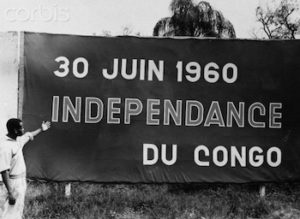
African Freedom
*On this date in 1960, the Democratic Republic of the Congo gained independence from Belgium. Patrice Lumumba, leader of the MNC-L, became the first Prime Minister.
In the fallout from the Léopoldville riots, the report of a Belgian parliamentary working group on the future of the Congo was published, and a strong demand for "internal autonomy" was noted. The Minister of the Colonies launched a high-profile Round Table Conference in Brussels in January 1960, with the leaders of the major Congolese parties in attendance. Lumumba, arrested following riots in Stanleyville, was released during the conference and headed the MNC-L delegation.
The Belgian government gained control due to white-European efforts shaped by the 19th-century Berlin Conference. They hoped for at least 30 years before independence, but Congolese pressure at the conference led to June 30, 1960, as the date. Issues including federalism, ethnicity, and the future role of Belgium in Congolese affairs were left unresolved after the delegates failed to reach an agreement.
King Leopold II ran the Congo using the mercenary Force Publique for personal gain. He initially extracted a fortune from the territory by collecting ivory. After a rise in the price of natural rubber in the 1890s, he forced labor from the native population to harvest and process rubber. Patrice Lumumba, leader of the MNC-L, became the first Prime Minister, pictured in Brussels at the 1960 Round Table Conference. Belgians began campaigning against Lumumba, whom they wanted to marginalize; they accused him of being a communist and, hoping to fragment the nationalist movement, supported rival, ethnic-based parties like CONAKAT.
Many Belgians hoped that an independent Congo would form part of a federation, similar to the French Community or the British Commonwealth of Nations. That close economic and political association with Belgium would continue. As independence approached, the Belgian government organized Congolese elections in May 1960. These resulted in an MNC relative majority. The proclamation of the independent Republic of the Congo and the end of colonial rule occurred with a ceremony at the Palais de la Nation in Léopoldville; King Baudouin gave a speech in which he presented the end of colonial rule in the Congo as the culmination of the Belgian "civilizing mission" begun by Leopold II.
After the King's address, Lumumba gave an unscheduled speech in which he angrily attacked colonialism and described independence as the crowning success of the nationalist movement. Although Lumumba's address was acclaimed by figures such as Malcolm X, it nearly provoked a diplomatic incident with Belgium; even some Congolese politicians perceived it as unnecessarily provocative. Nevertheless, independence was celebrated across the Congo.